|
|
|
Sort Order |
|
|
|
Items / Page
|
|
|
|
|
|
|
| Srl | Item |
| 1 |
ID:
069592
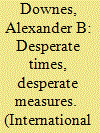

|
|
|
| 2 |
ID:
120046
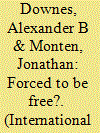

|
|
|
|
|
| Publication |
2013.
|
| Summary/Abstract |
Is military intervention effective in spreading democracy? Existing studies disagree. Optimists point to successful cases, such as the transformation of West Germany and Japan into consolidated democracies after World War II. Pessimists view these successes as outliers from a broader pattern of failure typified by cases such as Iraq and Afghanistan. Those in between agree that, in general, democratic military intervention has little liberalizing effect in target states, but contend that democracies can induce democratization when they explicitly pursue this objective and invest substantial effort and resources. Existing studies, however, often employ overly broad definitions of intervention, fail to grapple with possible selection effects in countries where democracies choose to intervene, and stress interveners' actions while neglecting conditions in targets. Astatistical examination of seventy instances of foreign-imposed regime change (FIRC) in the twentieth century shows that implementing prodemocratic institutional reforms, such as sponsoring elections, is not enough to induce democratization; interveners will meet with little success unless conditions in the target state-in the form of high levels of economic development and societal homogeneity, and previous experience with representative governance-are favorable to democracy. Given that prospective regime change operations are likely to target regimes in poor, diverse countries, policymakers should scale back their expectations that democracy will flourish after FIRC.
|
|
|
|
|
|
|
|
|
|
|
|
|
|
|
|
| 3 |
ID:
087288
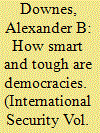

|
|
|
|
|
| Publication |
2009.
|
| Summary/Abstract |
Proponents of the selection effects argument claim that because democratic leaders run a higher risk of losing office than autocratic leaders if they fail to win wars, they are more careful than their authoritarian counterparts in choosing which wars to initiate. The robust marketplace of ideas in democracies also weeds out self-serving or ill-conceived policies and allows democratic leaders to better estimate the chances of victory. Democracies, according to this logic, tend to pick on weak or vulnerable opponents and thus win a disproportionate number of the wars they start. Both quantitative and qualitative evidence, however, challenges this conclusion. The statistical correlation between democracy and victory is not robust to reasonable alternative choices for analyzing the data. In particular, including draws as a war outcome renders statistically insignificant the finding that democratic initiators and targets are more likely to win. In addition, democratic leaders who initiate wars should be optimistic that they will win, but process tracing of the decision by Lyndon Johnson's administration to escalate the Vietnam War (one of these omitted draws) reveals that top officials knew at the time that escalation promised a costly, protracted stalemate, yet they chose to fight anyway. Moreover, domestic politics, if anything, contributed to Johnson's decision to fight in Vietnam despite the poor odds of victory because he believed that pulling out would spark a backlash and destroy his Great Society legislative program.
|
|
|
|
|
|
|
|
|
|
|
|
|
|
|
|
| 4 |
ID:
114188
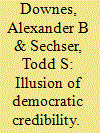

|
|
|
|
|
| Publication |
2012.
|
| Summary/Abstract |
Do democracies make more effective coercive threats? An influential literature in international relations argues that democratic institutions allow leaders to credibly signal their resolve in crises, thereby making their threats more likely to work than threats by nondemocracies. This article revisits the quantitative evidence for this proposition, which we call the "democratic credibility hypothesis," and finds that it is surprisingly weak. Close examination of the data sets most commonly used to test this hypothesis reveals that they contain few successful democratic threats, or indeed threats of any kind. Moreover, these data sets' outcome variables do not properly measure the effectiveness of threats, and therefore yield misleading results. The article then reassesses the democratic credibility hypothesis using the Militarized Compellent Threats data set, a new data set designed specifically to test hypotheses about the effectiveness of coercive threats. The analysis indicates that threats from democracies are no more successful than threats from other states.
|
|
|
|
|
|
|
|
|
|
|
|
|
|
|
|
| 5 |
ID:
081511
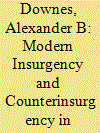

|
|
|
| 6 |
ID:
097371
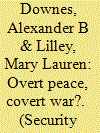

|
|
|
|
|
| Publication |
2010.
|
| Summary/Abstract |
Proponents and critics of the democratic peace have debated the extent to which covert attempts by democracies to overthrow other elected governments are consistent with or contradict democratic peace theory. The existing debate, however, fails to acknowledge that there are multiple democratic peace theories and that inter-democratic covert intervention might have different implications for different arguments. In this article, we first distill hypotheses regarding covert foreign regime change from three theories of democratic peace. Relying primarily on declassified government documents, we then investigate these hypotheses in the context of U.S. covert intervention in Chile (1970-73). The evidence suggests that covert intervention is highly inconsistent with norms and checks-and-balances theories of democratic peace. The evidence is more consistent with selectorate theory, but questions remain because democratic leaders undertook interventions with a low likelihood of success and a high likelihood that failure would be publicized, which would constitute exactly the type of policy failure that democratic executives supposedly avoid.
|
|
|
|
|
|
|
|
|
|
|
|
|
|
|
|
| 7 |
ID:
062081
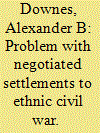

|
|
|
| 8 |
ID:
127895


|
|
|
| 9 |
ID:
079921
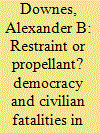

|
|
|
|
|
| Publication |
2007.
|
| Summary/Abstract |
This article investigates the effect of regime type on the number of civilian fatalities that states inflicted in interstate wars between 1900 and 2003. As opposed to several previous studies, the author finds little support for normative arguments positing that democracies kill fewer civilians in war. In fact, the author finds that democracies are significantly more likely than nondemocracies to kill more than fifty thousand noncombatants. Democracies also kill more civilians when they are involved in wars of attrition and kill about as many (and perhaps more) noncombatants than autocracies in such wars. These findings provide qualified support for institutional arguments about democratic accountability. Other implications of the institutional view, however, are not upheld, such as the argument that democracies select easy wars that should result in few civilian casualties because they are won quickly and decisively. Finally, democracies do not appear to kill fewer civilians in more recent wars
|
|
|
|
|
|
|
|
|
|
|
|
|
|
|
|
|
|
|
|
|